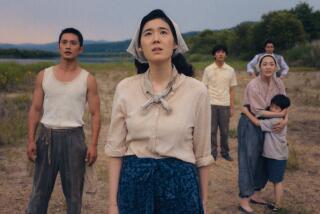Family Life Unfolds in ‘Tokyo Story’
- Share via
If you’ve seen the thrill-packed movie “The Fugitive,” Yasujiro Ozu’s meditative “Tokyo Story” might appear as if it’s operating in slow motion.
But this 1953 Japanese film is far from boring or tedious. “Tokyo Story” is a highly touching look at the subtle interactions within a family that has grown sadly apart over the years. By giving his work a relaxed, unhurried feel, Ozu manages to paint a vivid picture of real and ordinary life.
The film’s quiet, contemplative nature also reflects the artistic and spiritual temperament of traditional Japan. There’s a Buddhistic philosophy at work in “Tokyo Story” that’s poetically moving. Indeed, the elderly parents at the center of the film possess a stoic, Zen-like spirit that allows them to calmly deal with adversity.
“Tokyo Story” is cast into motion when the small-town father (Chishu Ryu) and mother (Chieko Higashiyama) go to Tokyo to visit two of their grown children. However, when the kindly old couple arrive, they find their pediatrician son too busy and their beautician daughter too self-absorbed to spend much time with them.
Nevertheless, the mother and father are philosophical about their children’s shortcomings. Parents expect too much from their offspring, they reason.
Fortunately, the couple can find solace in each other and in their loving daughter-in-law, Noriko. Though her husband was lost in battle during World War II, Noriko continues to feel a close attachment to her in-laws. It is she, and not the blood relatives, who really bonds with the couple during their stay.
Throughout “Tokyo Story,” Ozu displays a keen understanding of human nature. The film’s conscientious and thoughtful characters are its most self-critical ones. Conversely, its most callous figures seem blissfully unaware of how their actions negatively affect others.
But Ozu, who died in 1963, possessed more than just a deep feel for people. With “Tokyo Story” he was able to present that insight in a manner that is as artful and reflective as a beautifully conceived haiku.
“Tokyo Story” (1953), directed by Yasujiro Ozu. 134 minutes. Not rated.
More to Read
Only good movies
Get the Indie Focus newsletter, Mark Olsen's weekly guide to the world of cinema.
You may occasionally receive promotional content from the Los Angeles Times.










